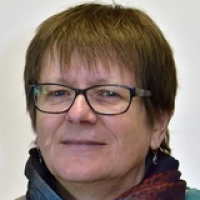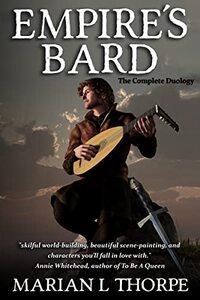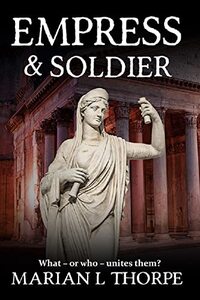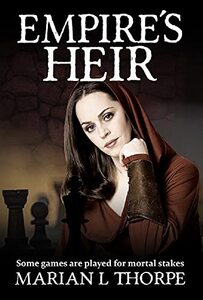Marian L Thorpe Interview Published on: 07, Sep 2020
 Where were you born and brought up? What impact has it had on your writing?
Where were you born and brought up? What impact has it had on your writing?
Southern Ontario, Canada. The location had almost no impact on my writing, as my books are set in a version of 7 th C Europe.
What inspired your first original story? Did you share the tale with anyone?The first story I remember writing was a play about an astronaut finding water on the moon. I read it to my parents, I think.
What developed your interest in the history of Britain?My parents were British immigrants, and Britain was always ‘home’; in addition, my father was a keen amateur historian of the Plantagenet and Tudor ages, so we had lots of history books. As for why Romano-British and post Roman history became my focus, I don’t really know. It just captured my interest.
Why did you decide to write historical fantasy and urban fantasy for mid-teens and up?Speculative fiction allows a writer to examine societal norms and suggest alternatives in a non- threatening manner; it also can help readers see that human desires and conflicts and needs are universal.
How did you come up with the idea of The Empire's Legacy series?I started with an image: a fishing village, a young woman, and just wrote. The first book was completely discovery writing – it just emerged under my fingers. After that, I understood my setting and its social structures, and stories developed around conflicts and action, and the related personal development of my characters.
Were you a big reader as a kid too? If so, what were some of your favourite books then?I was. All of Lucy Maud Montgomery’s Anne series; all of Arthur Ransome’s Swallows and Amazons books; almost anything I could put my hands on, really.
Which was the most challenging book to write in The Empire's Legacy series?Empire’s Reckoning, both structurally and thematically. It has a two time-line structure, which is a challenge to balance as there needs to be some relationship between the present and the past storylines, and the interweaving of the personal and political stories, which mirror each other to some extent, also stretched my abilities as a writer.
Who inspired the character of Sorley in "Empire's Reckoning: Empire's Reprise, Book I"?No one person, really. I play a little with traditional ‘fantasy’ tropes, even though my books aren’t technically fantasy, as there is no magic. But there is almost always a bard. So Sorley got that role. He wasn’t supposed to be a main character, though: when he reappeared in Empire’s Exile, it was a bit of a surprise even to me. His music – the quality of his songwriting and his voice – is based on the late Canadian singer-songwriter, Stan Rogers.
What kind of cultural value do you think reading and writing has/brings?Everything we know and imagine, envision and dream, comes from stories.
What is the significance of the title of your book, Oraiáphon: A Novella of The Empire?Oraiáphon is my world’s equivalent of Orpheus, from Greek myth. Orpheus was a musician of great skill, who took his music to the underworld to plead for the life of his love. In Oraiáphon, Sorley symbolically does the same.
How do you usually get new ideas for your books? Do you use any tricks to get "in the zone" and get your creative juices flowing?The stories now seem to create themselves, from the politics of the times and the characters’ personalities. They’re following a possible progression of a rapidly changing society – basically it’s a matter of saying ‘What if?’ within my created world, and finding out what the answer is. To get the creative juices going, I generally reread my previous writing.
What are some things that haven't been done in the Historical Fiction genre that you hope to introduce through your books?What I’m writing is a sub-genre of Historical Fiction that I haven’t got a name for: it’s not really alternative history, because there’s no point of separation from real history; it’s not quite fantasy, because there is no magic. It’s a world based heavily on our own, but slightly different. I’d like to see more of this, people dealing with recognizable, real-life conflicts and constraints, without the assistance of magic or limited to historical solutions.
In what ways are you trying to be more productive during quarantine?By being very disciplined about writing time and other writing-related activities. Because this is my full-time work, all that’s really changed is that I work entirely from home now, instead of using my university’s library and coffee shops, both of which I love to write in.
How has your experience of being associated with AllAuthor been?I’ve appreciated the graphics, and the Twitter promotions. I probably haven’t used it as much, or as well, as I should have as Empire’s Reckoning took up more of my time and attention than I’d planned in the last two years.
The writer of historical fantasy, Marian L Thorpe's books are historical fiction of an imagined world. Her stories are written both skillfully and sensitively. Ms. Thorpe does an excellent job of blending a sense of history and fantasy in every book she writes. When she's not writing or editing, she's birding.
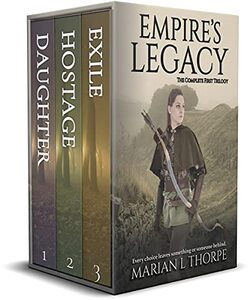 Empire's Legacy: The Complete Trilogy: Novels of an Alternative Dark Age
Genre: Historical Fiction, LGBT, Fantasy
Empire's Legacy: The Complete Trilogy: Novels of an Alternative Dark Age
Genre: Historical Fiction, LGBT, Fantasy
